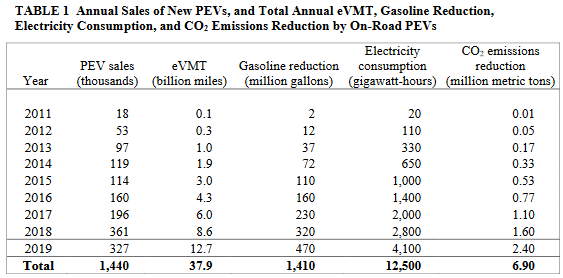A new report from the Argonne National Laboratory reveals that plug-in electric cars already started to make a small contribution to reducing the use of gasoline in the U.S.
As of 2019, there were some 1.4 million plug-in cars (sold cumulatively), which drove over 37 billion miles on electricity since 2010. In 2019, the total plug-in fleet reduced the national gasoline consumption by 0.34%.
Stats for 2019 (and cumulatively 2010-2019):
- over 1.4 million plug-in cars
- 12.7 billion miles (20.4 billion km) in 2019; since 2010 over 37 billion miles
- national gasoline consumption was reduced by 470 million gallons or 0.34% in 2019; by 1.4 billion gallons cumulatively
- plug-ins used 4.1 TWh of electricity in 2019 (about 3,000 kWh per car per year)
- 69% of plug-ins sold in the U.S. since 2010 have been assembled in the U.S.
- over 60 GWh of lithium-ion batteries have been installed cumulatively

By the way, Argonne National Laboratory mentioned InsideEVs as one of its data sources about the plug-in car market, which makes us very proud. See the full report here.
The U.S. DOE’s Office of Energy Efficiency & Renewable Energy presents also that the amount of energy saved by plug-in cars has increased in 2019 by over 47% year-over-year.
“Due to their efficiency, plug-in electric vehicles (PEVs) reduce the amount of energy used by light-duty vehicles compared to their internal combustion engine counterparts. Estimates show that the energy savings in the United States due to light-duty PEVs in 2019 was 44.8 trillion Btu, up 47% from 2018.”

“Notes: Gasoline conversion to Btu using gross heating value 125,000 Btu/gallon. Electricity conversion to Btu using 3,412 Btu/kWh.
Source: Argonne National Laboratory, Assessment of Light-Duty Plug-In Electric Vehicles in the United States, 2010 – 2019, June 2020.”
